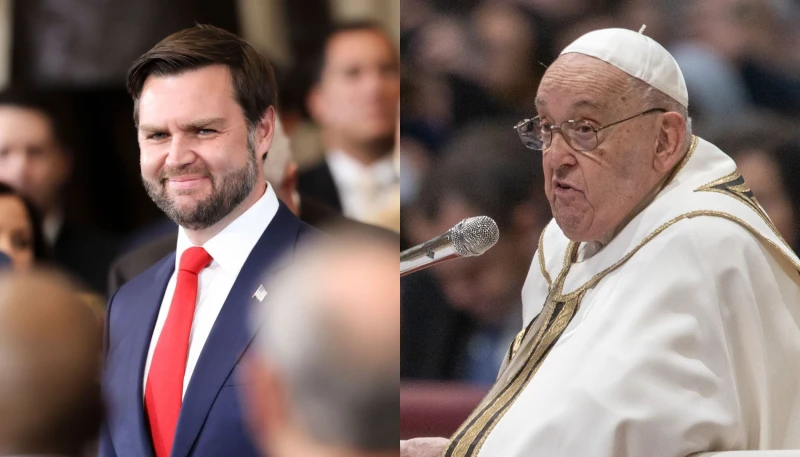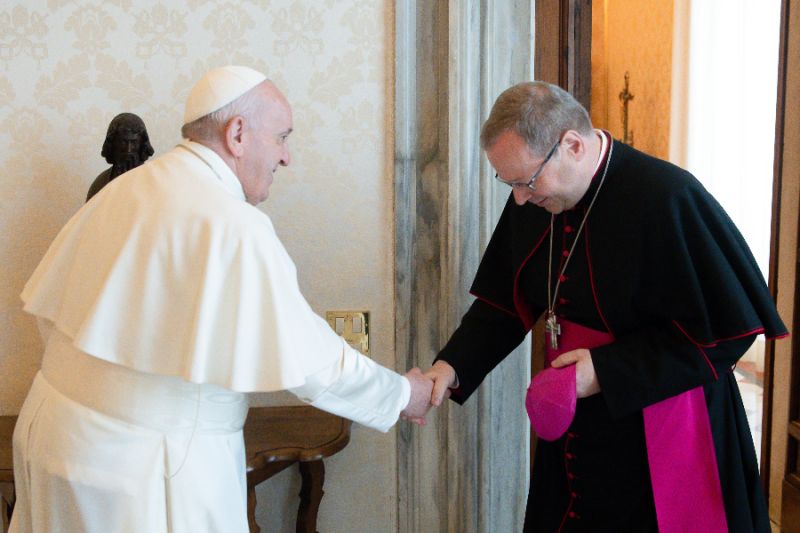Pope Francis, Vance clash over ‘ordo amoris’

 In a Feb. 10, 2025, letter to the U.S. bishops in which he expressed concern over President Donald Trump’s “program of mass deportations,” Pope Francis also appeared to criticize Vice President JD Vance’s use of the Catholic term “ordo amoris” in the context of the present debate over immigration. / Credit: Kevin Lamarque – Pool/Getty Images; Daniel Ibañez/CNA
In a Feb. 10, 2025, letter to the U.S. bishops in which he expressed concern over President Donald Trump’s “program of mass deportations,” Pope Francis also appeared to criticize Vice President JD Vance’s use of the Catholic term “ordo amoris” in the context of the present debate over immigration. / Credit: Kevin Lamarque – Pool/Getty Images; Daniel Ibañez/CNA CNA Staff, Feb 13, 2025 / 09:30 am (CNA).
In a recent letter to the U.S. bishops in which he expressed concern over President Donald Trump’s “program of mass deportations,” Pope Francis also appeared to criticize Vice President JD Vance’s use of the Catholic term “ordo amoris” in the context of the present debate over immigration.
Vance, a Catholic, had in a late January interview invoked an “old school … Christian concept” he later identified as the “ordo amoris,” which he said teaches that one’s “compassion belongs first” to one’s family and fellow citizens, “and then after that” to the rest of the world.
“[Y]ou love your family, and then you love your neighbor, and then you love your community, and then you love your fellow citizens in your own country, and then after that you can focus and prioritize the rest of the world,” Vance said.
Writing to the U.S. bishops on the topic of migration, the pope wrote Feb. 10 that “an authentic rule of law is verified precisely in the dignified treatment that all people deserve, especially the poorest and most marginalized,” which he said “does not impede the development of a policy that regulates orderly and legal migration.”
However, “this development cannot come about through the privilege of some and the sacrifice of others,” Pope Francis said.
“Christian love is not a concentric expansion of interests that little by little extend to other persons and groups,” the pope wrote.
“In other words: The human person is not a mere individual, relatively expansive, with some philanthropic feelings! The human person is a subject with dignity who, through the constitutive relationship with all, especially with the poorest, can gradually mature in his identity and vocation,” he continued.
“The true ordo amoris that must be promoted is that which we discover by meditating constantly on the parable of the ‘good Samaritan’ (cf. Lk 10:25-37), that is, by meditating on the love that builds a fraternity open to all, without exception.”
Francis in his letter proposed that a “rightly-formed conscience” would disagree with associating the illegal status of some migrants with criminality, while at the same time he affirmed a nation’s right to defend itself from people who have committed violent or serious crimes.
“That said, the act of deporting people who in many cases have left their own land for reasons of extreme poverty, insecurity, exploitation, persecution, or serious deterioration of the environment damages the dignity of many men and women, and of entire families, and places them in a state of particular vulnerability and defenselessness,” the pope continued.
“I exhort all the faithful of the Catholic Church, and all men and women of goodwill, not to give in to narratives that discriminate against and cause unnecessary suffering to our migrant and refugee brothers and sisters. With charity and clarity we are all called to live in solidarity and fraternity, to build bridges that bring us ever closer together, to avoid walls of ignominy and to learn to give our lives as Jesus Christ gave his for the salvation of all.”
What is the ‘ordo amoris’?
Ordo amoris, often rendered “rightly-ordered love,” is a well-established principle considered evident through both revelation and reason, Dominican Father Pius Pietrzyk told CNA earlier this month. That said, while the concept is well established, its practical application can be complex, and there can be legitimate disagreement on specifics.
St. Augustine first introduced the term, explaining that a person living a just and holy life is one who appropriately directs his or her affections: not loving what should not be loved, loving what ought to be loved, and ensuring the proper degree of love is given to each thing or person.
St. Thomas Aquinas built upon Augustine’s work centuries later, writing that there must be a specific “order in things loved out of charity.” In this “ordo caritatis,” according to Aquinas, God should be loved first and foremost, followed by oneself, and then one’s neighbors, with a more intense affection for those more closely related, such as family.
While acknowledging that certain relationships carry more immediate obligations — for instance, a married person has a greater responsibility to care for their spouse and children before attending to the needs of others — Aquinas’ approach requires taking into account certain situational difficulties and urgent needs, especially the greater need of an individual in the moment.
“[W]e ought in preference to bestow on each one such benefits as pertain to the matter in which, speaking simply, he is most closely connected with us,” Aquinas writes in the “Summa Theologica.”
“And yet this may vary according to the various requirements of time, place, or matter in hand: Because in certain cases one ought, for instance, to succor a stranger, in extreme necessity, rather than one’s own father, if he is not in such urgent need.”
‘A closing of the heart’
Vance’s mention of the “ordo amoris” as a defense of Trump’s widely criticized immigration policies sparked a worldwide debate, with some Catholic figures criticizing the vice president’s understanding and use of the concept and others, including several Catholic theologians and philosophers, expressing concurrence and appreciation.
Writing at the National Catholic Register, commentator Father Raymond de Souza opined that Pope Francis, far from advocating open borders, rather condemns “a closing of the heart to immigrants, a denigration of their dignity and the political exploitation of their plight.”
“[T]he conflict between the Holy Father and Vance is likely more about language than theology. It is difficult to hear in the Trump-Vance rhetoric love for the immigrant, whether properly ordered or not. Francis insists that even those refused entry, or returned, are to be treated with dignity and fit within the ordo amoris,” de Souza wrote.
“The decision to address the Vance comments is likely due to his remarkably hostile accusation that the U.S. bishops’ refugee programs — under contract with the U.S. government — are motivated by a desire to pad ‘the bottom line.’ Cardinal Timothy Dolan of New York called those remarks ‘scurrilous’ and ‘very nasty.’ They also were not true,” de Souza continued.
“The Holy Father likely felt it necessary to express solidarity with the American bishops.”




